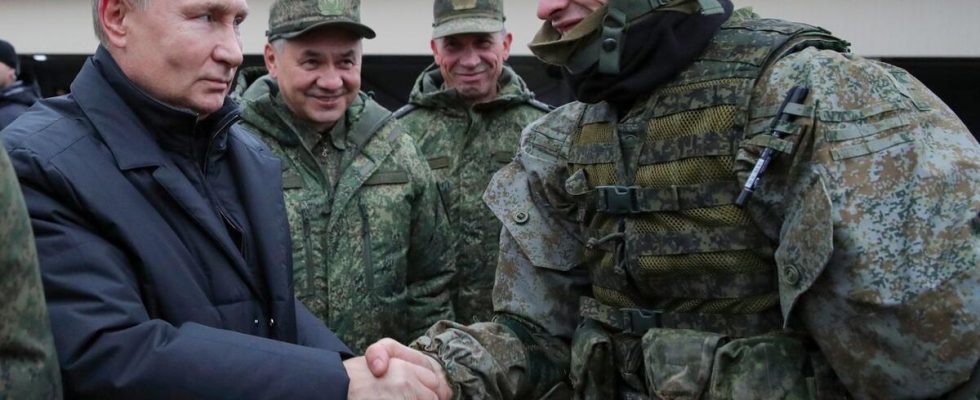Vladimir Putin’s fifth term in office begins on Tuesday. He will soon be in power in Russia for 25 years. Putin’s system appears to be more stable than ever – but this impression could be misleading.
In these May days, Moscow’s security apparatus is protecting the long-time president
The Russian president has repeatedly stated that he is striving for a new multipolar world order – away from US supremacy. And he is portraying his war against Ukraine as a fight against NATO and the West as a whole. In the third year of the invasion, his power apparatus is brimming with self-confidence – also because Western sanctions have so far neither been able to stop the Russian war machine nor bring the country to its knees economically.
War economy causes Russia’s economy to boom
Putin said at the end of April that the economic basis was solid and the dynamics were good. “Industrial activity is growing.” Since the embargo in the West, the raw materials power has been selling its oil and gas primarily to the East, to China and India. Thanks in part to the ramped-up war economy, Russia is expecting growth of around three percent this year. A good employment situation and stable incomes also ensure loyalty among the population, as experts emphasize.
“Russia’s successes in adapting to war have actually exceeded expectations,” says expert Maxim Samorukov from the US think tank Carnegie. “Putin’s system today appears to be more invulnerable than ever.” The current advance of Russian troops outshines the initial defeats in the war. Western military experts also attest to the Russians’ tactical successes on the front.
Nevertheless, peace negotiations with Russia are not in sight. Moscow emphasizes its readiness for such negotiations almost every day. But doubts remain that Putin is serious. Rather, it is to be expected that the army will not only fully annex the annexed but so far only partially controlled areas of Luhansk, Donetsk, Kherson and Zaporizhzhia. Putin, who has an arrest warrant issued by the World Criminal Court in The Hague for war crimes in Ukraine, could at least want to conquer Kharkiv in the east and Odessa in the south in order to deprive Ukraine of its last access to the world’s oceans on the Black Sea.
As of now, it is only clear that the invasion will have a significant impact on Putin’s new term in office. The Kremlin chief is not expected to have an easy reign in the next six years. There are plenty of problems and risks.
Power struggles in Vladimir Putin’s environment
Putin will also appoint a new government after the inauguration, as the existing one traditionally submits its resignation first. No serious changes are expected. However, the Kremlin boss will once again have to balance the various interest groups in order to counteract power struggles. In the middle of the war, he is currently having to watch as one of the country’s most powerful military officers, Deputy Defense Minister Timur Ivanov, was taken into custody for bribery.
Many Russians rub their eyes because such influential representatives of the security apparatus with access to vast resources are usually not publicly pilloried. “The contradictions within the system are growing and are being resolved with violence,” writes political scientist Andrei Pertsev in an analysis for Carnegie. He sees that, unlike in the past, Putin hardly acts as an arbitrator between the different groups. “The influential groups are even attacking each other more actively than before the war,” says Pertsev.
Many still remember the rebellion of the head of the private army Wagner,
After the horror, there was a feeling of calm. But the case of Shoigu’s now imprisoned confidant Ivanov shows, according to experts, that things are still simmering – and that other groups could also try to limit the influence of the defense minister, who is friends with Putin. Others may try to seize power.
The security situation remains tense
The security situation in the country is anything but stable. Last but not least, the horror of the terrorist attack on the Crocus City Hall concert hall near Moscow, which left more than 100 dead and hundreds injured, is still fresh. The fight against terrorism is not over.
In addition, regions on the border with Ukraine – especially Belgorod – are increasingly exposed to shelling and attacks from the Ukrainian side. The deaths, injuries and massive destruction are putting Russian authorities under pressure. There are repeated allegations that Putin was unable to keep his security promises.
Kiev invokes its right to defense by destroying fuel depots and military bases on the Russian side. However, the consequences of such attacks are disproportionate to the massive destruction and many victims on the Ukrainian side.
Experts believe Putin’s system is unstable
This does not yet cause Putin’s system itself to falter. Everything seems under control. “But at any moment everything can get out of hand,” says political scientist Samorukov. The danger does not come from Putin’s opponents, the opposition is fragmented and further weakened after the death of Putin’s opponent Alexei Navalny, but from the inner core of the system itself, i.e. from Putin, because everything is focused solely on him as the bearer of all decisions .
Putin has been living “for many years in a narrow circle of subservient courtiers who only feed his prejudices, resentments and delusions,” says Samorukov. Wrong decisions could at some point become suicidal – and lead to the collapse of the system, says the expert.
Repression will probably continue to increase
The Kremlin always rejects the fact that Putin lives in an illusory world, is informed one-sidedly by subordinates and has lost touch with reality or that his health is poor. However, experts expect that after an increasingly authoritarian course in recent years, the Kremlin chief is likely to intensify political repression in order to maintain power.
The image of a fortress that Moscow presents as a center of power in these May days fits in with this. At the three planned major events, Putin now wants to show that he is not isolated internationally – and that he will probably be a force to be reckoned with on the world stage for a long time to come.
He has already outpaced most Russian rulers in remaining in power. In August he will have been in power for 25 years – sometimes as head of government and mostly as president. He soon caught up with Soviet dictator Josef Stalin. And if he runs for election again in 2030 and is elected again, he could end up ruling even longer than Catherine the Great, who held the reins of power for 34 years. (dpa/mcf)
Two journalists who also work for foreign media were arrested in Russia because they are said to have supported the team of the late Kremlin critic Alexei Navalny. They are accused of “extremism”.


“This is how the editorial team works” informs you when and what we report on, how we deal with errors and where our content comes from. When reporting, we adhere to the guidelines of Journalism Trust Initiative.

